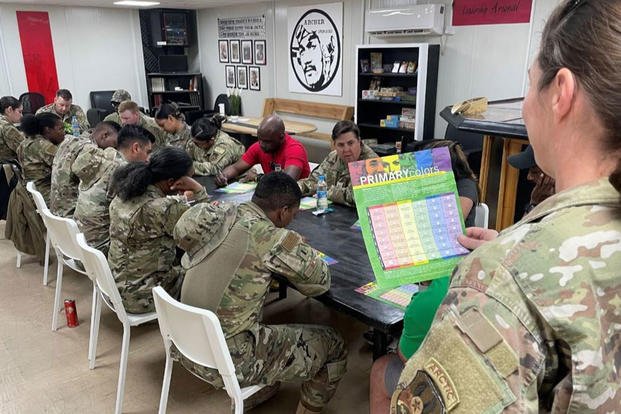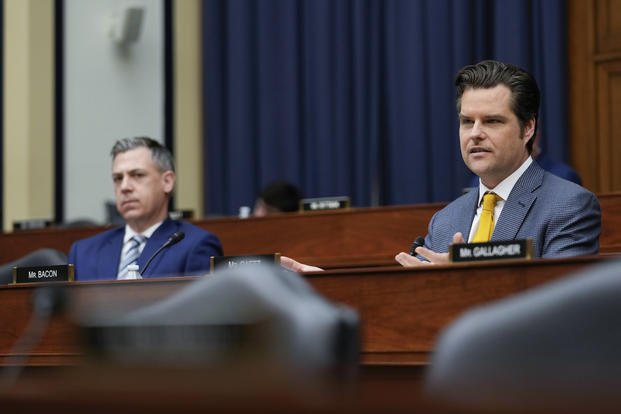Fights over diversity training, COVID-19 and LGBTQ+ troops dominated the House Armed Services Committee's yearly markup of its annual defense policy bill as lawmakers debated on into the night Wednesday.
But Republicans and Democrats on the panel ultimately agreed to several bipartisan measures that improve bread-and-butter issues for service members. The bill includes new bonuses for junior troops and one of the highest military pay raises in recent history.
After a marathon session, the committee voted 58-1 early Thursday to approve its version of the $886 billion National Defense Authorization Act, or NDAA, sending the must-pass bill to the full House for expected passage later this summer. The lone "no" vote came from Rep. Ro Khanna, D-Calif.
Read Next: Air Force's Elite Close-Air Support Jobs May Be Cut by 44%
The bonuses would go to E-6s and below who are adversely affected by the economy, and a 5.2% raise in base pay for all service members would be the biggest bump in two decades.
Other quality-of-life proposals in the bill include allowing more flexibility to adjust the Basic Allowance for Housing to respond to housing market conditions. The bill would also exclude the housing allowance from income calculations for a stipend to help food insecure troops, which advocates have said has limited the number of service members eligible for the two-year-old Basic Needs Allowance by distorting the true picture of their finances.
In addition to needing to pass the full House, the bill must also be reconciled with the Senate's version before becoming the law. The Senate Armed Services Committee is also debating its draft of the NDAA this week, but doing so behind closed doors.
While the annual bill sets a wide range of boilerplate Pentagon policies, this year's 14-hour committee debate on the NDAA was marked by lawmakers sparring over culture war issues that Republicans have been gearing up to target for months.
Still, some of the most contentious issues, including abortion and transgender health care, were avoided, though they will likely be raised when the bill hits the House floor.
Here are some of the highlights:
Diversity and Inclusion
After multiple fiery hours of debate on the utility of diversity programs in the military and whether racism in the U.S. is systemic, the committee approved several GOP amendments aimed at rolling back those diversity programs.
The testy exchanges saw Rep. Steven Horsford, D-Nev., accusing Rep. Matt Gaetz, R-Fla., who offered three of the amendments, of wanting "to create divisions in the military." Gaetz shot back that Horsford "can't impugn my motive" and asked for Horsford's comment to be formally removed from the record. Rather than take the official reprimand, Horsford reworded his comments for the formal record.
Gaetz, for his part, said his amendments were about removing a "radical race ideology" that Republicans have accused the Biden administration of injecting into the military, despite the fact that there have been no substantial changes to diversity training in the military since the start of the administration.
Among the approved amendments were ones to ban teaching about critical race theory at service academies and in other military training, and to require the Pentagon to submit a report on how much time and money it has spent on critical race theory training. Critical race theory is a study of the intersection of law and racism that is largely confined to graduate school courses.
The other approved amendments would eliminate the position of chief diversity officer, which was created in the 2020 NDAA that received broad bipartisan support; shut down the Defense Advisory Committee on Diversity and Inclusion, a civilian board that offers recommendations to Pentagon leaders; and cap the pay of any military or civilian employee in charge of diversity and inclusion at the equivalent of a GS-10, which is a midlevel bureaucrat.
While those proposals advanced, two other amendments with the same goal failed after GOP Reps. Mike Turner of Ohio and Don Bacon of Nebraska crossed party lines to vote with Democrats in opposition. The failed amendments would have banned any diversity, equity and inclusion training in the military, and eliminated the position of deputy inspector general for diversity and inclusion and extremism in the military.

LGBTQ+ Issues
While the committee Republicans did not seek to roll back health care for transgender troops as appropriators have this year, other LGBTQ+ issues were debated.
Most prominently, the committee voted 33-26 to ban Pentagon funding for drag shows, with Democratic Reps. Gabe Vasquez of New Mexico and Don Davis of North Carolina voting with Republicans in support of the amendment.
Following concerted GOP pressure, Defense Secretary Lloyd Austin has already banned drag shows on military bases, which were sponsored by private organizations and not funded with taxpayer money. But Gaetz, who sponsored the amendment, said a ban needs to be put into law to "clear up" the policy.
Rep. Mark Alford, R-Mo., also said legislation was needed to stop "oversexualized performances that are being perpetrated on stages across America."
Along party lines, the committee also approved an amendment to require the Pentagon to study the effect on the military of President Joe Biden's 2021 executive order that required government agencies to review policies to ensure they do not discriminate based on gender identity or sexual orientation.
Rep. Jim Banks, R-Ind., the sponsor of the amendment, framed it as necessary to protect female troops from "men entering women's only spaces" -- meaning cisgender and transgender women using the same bathroom.
On both the drag ban and Banks' amendment, Democrats argued Republicans were not only attacking LGBTQ+ troops, but that service members are not concerned about those issues.
"I represent the largest military community in the entire country, and I can confidently say that not a single service member or military family has ever, not once, complained to me about drag shows," said Rep. Sara Jacobs, D-Calif. "They call me about housing. They call me about child care. They call me about food security."
Without debate, the committee also approved an amendment from Banks to suspend a pilot program that the Navy has already ended that asked five sailors to use their social media accounts to promote the service. Republicans turned against the program after they realized a sailor who performs as a drag queen was one of the "digital ambassadors."
'Parents' Rights'
As fights over book bans and curriculum restrictions on LGBTQ+ and racial issues rage at the local and state level, the House Armed Services Committee adopted a "parents' bill of rights" for the school system that serves military children.
The same amendment was adopted last year with little debate as Republicans framed it as a straightforward measure to allow parents to be more involved in their children's education. It was stripped from the final version of the NDAA signed into law.
Since last year, the culture war over schools has gotten only more intense and has touched the Department of Defense Education Activity. Republicans have fumed about DoDEA's now-former diversity chief, a Black woman who complained about white people on social media, and books in the system's high school libraries related to LGBTQ+ issues and sex education.
This year, Republicans more explicitly framed the amendment as targeting "radical progressive ideologies" in DoDEA schools, in the words of Rep. Cory Mills, R-Fla., during Wednesday's debate.
The amendment, offered by Rep. Elise Stefanik, R-N.Y., would give DoDEA parents the right to review their school's curriculum, budget, instructional materials, teacher professional development materials and all books in the school library.
Seven Democrats did vote with Republicans in support of the amendment: Reps. Chrissy Houlahan of Pennsylvania, Elissa Slotkin of Michigan, Jared Golden of Maine, Davis, Horsford, Jimmy Panetta of California and Jeff Jackson of North Carolina.
But most Democrats argued the amendment was redundant to existing DoDEA policies that allow for parental involvement and that it is a stealth way to bring book bans and curriculum restrictions to DoDEA schools.
"There is a very narrow conservative agenda, and this amendment wants to empower parents to dictate that agenda into schools in a more effective manner," said Rep. Adam Smith, D-Wash., the ranking member of the committee.
COVID-19
While most Americans are no longer adjusting their daily lives because of the COVID-19 pandemic and the Pentagon dropped its COVID-19 vaccine mandate for troops at the beginning of the year, pandemic politics were still roaring during the committee's NDAA debate.
Specifically, the panel approved several GOP amendments aimed at protecting former service members who were discharged over their refusal to get the vaccine, including one amendment to allow those troops to be reinstated at the rank held when they were separated and without the discharge affecting future career advancement.
Others would require discharge review boards to take up requests to upgrade discharges for those booted solely over vaccine refusal; mandate that the Pentagon must reach out to discharged troops about how they can apply to be reinstated; exempt service academy students who weren't commissioned because they refused the vaccine from having to pay back their taxpayer-funded tuition; and direct the Pentagon to study how much it would cost to give the discharged troops back pay and a $15,000 bonus.
-- Rebecca Kheel can be reached at rebecca.kheel@military.com. Follow her on Twitter @reporterkheel.
Related: Biggest Troop Pay Raise in 2 Decades on Track in House Defense Bill












